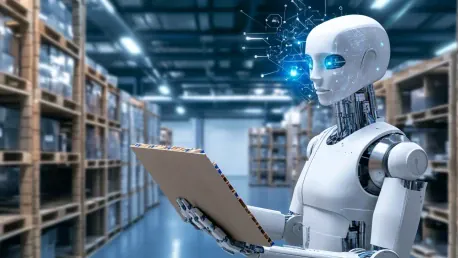Artificial intelligence (AI) is making waves across various sectors, and the pallet and lumber industry is no exception. As companies strive to stay competitive, the integration of AI into human resources (HR) functions presents a transformative opportunity. This article explores how AI is revolutionizing HR in this industry, enhancing efficiency, and driving growth. By enhancing recruitment and talent acquisition processes, streamlining employee onboarding, boosting engagement and retention, improving employee monitoring, and providing strategic recommendations for implementation, AI is proving to be an invaluable tool in modernizing HR functions across the board.
Enhancing Recruitment and Talent Acquisition
AI tools are streamlining the recruitment process by automating resume screening and categorization. These tools quickly scan resumes for relevant keywords, skills, and experience, significantly reducing the time spent on manual reviews. This is particularly beneficial for hiring management, sales, maintenance, and administrative roles within pallet plants. With AI handling the initial filtering, HR professionals can focus more on engaging with top-tier candidates and making insightful decisions based on AI-driven recommendations. This efficiency not only shortens the hiring timeline but also enhances the quality of candidates selected.
AI-powered chatbots are also transforming candidate interactions. These chatbots handle initial queries, schedule interviews, and streamline the application process, reducing administrative workload and providing instant communication. Predictive hiring tools use historical data and machine learning models to forecast candidate success, further optimizing the recruitment process. By leveraging these intelligent systems, companies can ensure they are not only filling positions quickly but also hiring individuals who are likely to thrive and contribute positively to the organization’s goals. The result is a more dynamic and successful workplace where talent is proactively managed and nurtured right from the recruitment stage.
Streamlining Employee Onboarding
The onboarding process is another area where AI can make a significant impact. Automated systems can handle document submission, training, and policy dissemination, creating a seamless experience for new hires. Personalized onboarding plans guide new employees through each step, ensuring they understand company culture, policies, and their roles. These tailored plans facilitate smoother transitions, enabling new employees to become productive members of the team more rapidly. The ability of AI to customize onboarding based on the individual’s role and previous experience ensures that every new hire receives the support and information they need to succeed.
AI chatbots act as virtual onboarding assistants, offering real-time support and answers to new employees’ questions. This not only enhances the onboarding experience but also helps new hires feel more connected and informed from day one. By providing instant help and clarifications, these virtual assistants reduce the burden on HR staff and ensure that common questions are answered promptly. AI-driven onboarding tools create an environment where new employees can acclimate quickly, understand their responsibilities, and feel welcomed into the company culture. This sets a positive tone from the start, fostering higher employee satisfaction and engagement.
Boosting Employee Engagement and Retention
AI is proving invaluable in analyzing employee feedback to gauge sentiment and identify areas of concern. By recommending personalized learning and development plans tailored to individual roles, skills, and career aspirations, AI helps enhance job satisfaction and retention. When employees see that the company is invested in their growth and development, they are more likely to feel valued and committed to the organization. AI-driven platforms can also provide real-time feedback on performance, helping employees to continuously improve and align their goals with those of the company.
Predictive analytics can identify employees at risk of leaving by analyzing engagement levels and work patterns. This allows HR to take proactive measures to retain valuable talent. Tools like Lattice, SurveyMonkey, and BambooHR are effective in implementing these strategies. By addressing issues before they escalate and providing targeted interventions, companies can reduce turnover rates and maintain a stable, motivated workforce. These AI tools not only help in understanding employee sentiment but also in creating an environment where employees feel heard, supported, and incentivized to stay. This leads to a more cohesive and dedicated team, driving overall organizational success.
Improving Employee Monitoring and Process Efficiency
AI-based performance management tools provide real-time feedback on production processes. AI-driven cameras and sensors monitor various functions and data points across saws, repair lines, and nailing machines, offering data-driven insights that enhance operational efficiency. These tools can identify bottlenecks, inefficiencies, and areas for improvement in real-time, allowing companies to make timely adjustments and optimize their processes. With AI continuously monitoring operations, businesses can ensure that their production lines are running smoothly and efficiently.
Zira, in partnership with Alliance Automation, exemplifies how AI technology can be effectively utilized within the pallet industry. These tools help companies optimize their processes, reduce downtime, and improve overall productivity. By leveraging AI, companies can gain a competitive edge through better resource management and streamlined operations. The ability to analyze vast amounts of data and derive actionable insights ensures that businesses are constantly improving and adapting to changing conditions. The integration of AI into process monitoring not only enhances efficiency but also contributes to safer and more reliable operations, ultimately leading to increased profitability and sustainability.
Strategic Implementation of AI
Artificial intelligence (AI) is transforming numerous industries, and the pallet and lumber sector is not left behind. Companies aiming to remain competitive are increasingly integrating AI into their human resources (HR) functions, leading to significant changes. This article delves into the ways AI is reshaping HR within this industry, by enhancing efficiency and fostering growth. AI is revolutionizing recruitment and talent acquisition processes, making them more effective. Additionally, it streamlines employee onboarding, aids in boosting employee engagement and retention, and improves employee monitoring practices. AI also offers valuable strategic recommendations for implementation, proving to be an essential tool in modernizing HR functions across the board. By leveraging AI, companies within the pallet and lumber industry can not only enhance operational efficiency but also ensure sustainable growth and competitiveness in the modern market. The integration of AI into HR represents a pivotal shift towards a more innovative and efficient future.









